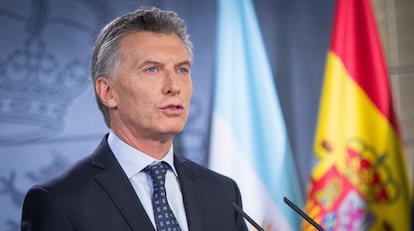Argentina “has stopped blaming the world” for its problems: Macri
At forum in Madrid, leader says change in his country has come from below up
Argentina’s President Mauricio Macri said on Friday that his country had embarked on a definitive change of course, based on what he described as a collective decision to “stop blaming the world for what is happening to us.”

Speaking on the third day of his official visit to Spain at an investment forum in Madrid organized by EL PAÍS and the PRISA media group of which the paper is part, Macri insisted that his election in 2015 represented a change “from the ground up”, reflecting a desire on the part of voters to end the policies implemented during the previous 13 years under Néstor Kirchner and then his wife Cristina Fernández de Kirchner.
“Many people ask me why Argentina is not going to surprise people negatively this time,” he told PRISA Chairman Juan Luis Cebrián, adding: “You have to understand the process. This isn’t something I invented. Argentinians said [we have had] enough of deluding ourselves, of blaming the world for what is going on, of playing the role of victims, of our self-pitying nationalism. The people said: we have the ability, let’s develop it.”
The problem isn’t globalization: it’s the electronic revolution President Mauricio Macri
Macri also asked for time, calling on investors to be patient: “You don’t exit populism from one day to the next. This is a process of purification.”
At the same time, the president highlighted his confidence in the capacity of the people of Argentina to find solutions to take their country forward: “Argentina changed, we know we have talent, innovation. After so many years of chaos we’ve become very creative,” he said to laughter from delegates.
It will take time for Argentina to emerge from its crisis, which includes rampant inflation, although this year he said the country’s economy would grow: “The difficulties are not over yet, but we have put intolerance to one side and now the truth is on the table.”
But doubts remain among the international investment community as to whether Argentina’s government has the support it needs to carry out its promises of economy reform.
You don’t exit populism from one day to the next. This is a process of purification President Mauricio Macri
“The important thing is that this government has the time to do things. The destruction of recent years has been huge and time is needed. The important thing is the next government, whether it is this one or another, continues with these policies,” said Francisco González, president of BBVA bank, which has a strong presence in Argentina.
Asked about his opinion of Donald Trump, Macri, who has done business with the US president, avoided criticism. “He needs to be given time. He is a very pragmatic man. He will act on the basis of what he sees is possible. He feels what many Americans see, which is that I am a rich country and people are taking advantage of me. He wants to find a new place to negotiate from. We’ll have to see if he finds it. There is a lot of concern in the world about the future of employment, and that has frightened a lot of people and that means people take extreme views. But the problem isn’t globalization: it’s the electronic revolution. And that cannot be stopped, just like the industrial revolution couldn’t be stopped. We have to adapt,” he said.
In a debate on Thursday evening with Peruvian Nobel literature laureate Mario Vargas Llosa, Macri defended globalization in the face of mounting protectionism around the world, illustrated by Trump’s decision to leave the Trans-Pacific Partnership trade deal, as well as his intention to renegotiate the North American Free Trade Agreement (NAFTA) with Mexico and Canada.
English version by Nick Lyne.
Tu suscripción se está usando en otro dispositivo
¿Quieres añadir otro usuario a tu suscripción?
Si continúas leyendo en este dispositivo, no se podrá leer en el otro.
FlechaTu suscripción se está usando en otro dispositivo y solo puedes acceder a EL PAÍS desde un dispositivo a la vez.
Si quieres compartir tu cuenta, cambia tu suscripción a la modalidad Premium, así podrás añadir otro usuario. Cada uno accederá con su propia cuenta de email, lo que os permitirá personalizar vuestra experiencia en EL PAÍS.
¿Tienes una suscripción de empresa? Accede aquí para contratar más cuentas.
En el caso de no saber quién está usando tu cuenta, te recomendamos cambiar tu contraseña aquí.
Si decides continuar compartiendo tu cuenta, este mensaje se mostrará en tu dispositivo y en el de la otra persona que está usando tu cuenta de forma indefinida, afectando a tu experiencia de lectura. Puedes consultar aquí los términos y condiciones de la suscripción digital.









































